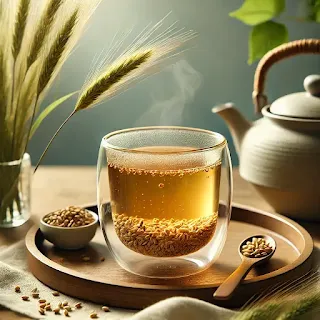Barley tea, or "boricha" as it is known in Korea, is a time-honored drink cherished for its numerous health benefits. Made by roasting and steeping barley grains, this caffeine-free tea has been a staple in Korean households for centuries. In this article, we'll explore why barley tea is more than just a refreshing drink—it's a wellness elixir.
📋 Table of Contents
1. History and Tradition of Barley Tea
Barley tea has been a part of Korean culture for centuries, often served as a daily beverage.
Historically, it was used not only as a thirst quencher but also for its health benefits.
The process of roasting barley enhances its flavor and creates its signature nutty taste.
In traditional Korean households, barley tea was brewed in large batches and kept ready to serve.
It has been used in temples and homes alike for its calming and grounding properties.
Barley tea remains a symbol of warmth and hospitality in Korean culture.
Today, it is enjoyed hot in winter and chilled in summer, making it a versatile year-round drink.
2. Nutritional Profile of Barley Tea
Barley tea is naturally caffeine-free, making it a great option for all age groups.
It contains vitamins like B-complex and minerals such as magnesium and selenium.
The tea is low in calories, which makes it an excellent hydrating drink.
Barley contains beta-glucans, which are known to support heart health and immunity.
Its antioxidants help combat oxidative stress, promoting overall well-being.
The roasted grains also provide a small amount of dietary fiber when brewed.
This makes barley tea a wholesome, nourishing beverage suitable for daily consumption.
3. Benefits for Digestive Health
Barley tea is renowned for its digestive benefits and is often consumed after meals.
It helps in reducing bloating and improving gut motility.
Compounds in barley are believed to promote the growth of good gut bacteria.
The tea is known to soothe an upset stomach and alleviate mild indigestion.
It is gentle on the stomach, making it ideal for people with sensitive digestion.
Drinking barley tea regularly may contribute to a healthier digestive system overall.
This is one of the reasons why it has been a staple in Korean diets for so long.
4. Antioxidant Properties
Barley tea is rich in antioxidants, including compounds like ferulic acid.
These antioxidants help protect the body from free radical damage.
The tea's antioxidant profile supports skin health and reduces signs of aging.
Consuming barley tea can also improve cell regeneration and repair.
It aids in reducing inflammation, which is linked to various chronic conditions.
Regular consumption may help enhance overall vitality and energy levels.
Antioxidants in barley tea also contribute to improved heart health and immunity.
5. Hydration and Detoxification
Barley tea is an excellent hydrating beverage, especially in hot climates.
It contains no caffeine, which can dehydrate the body, making it suitable for all-day consumption.
The tea has natural diuretic properties that help flush out toxins from the body.
This detoxification process supports kidney function and overall health.
Drinking barley tea regularly helps maintain fluid balance in the body.
Its light, nutty flavor makes it a refreshing alternative to sugary drinks.
Whether served hot or cold, barley tea is an excellent choice for hydration and cleansing.
6. Role in Weight Management
Barley tea is low in calories, making it a perfect addition to a weight management plan.
It helps curb hunger cravings, reducing the likelihood of overeating.
The tea's antioxidants support metabolic health, which aids in weight control.
Its diuretic properties help eliminate water retention and bloating.
Barley tea is often consumed in detox regimens for its cleansing effects.
Replacing sugary drinks with barley tea can significantly lower daily calorie intake.
It is a healthy, satisfying beverage for those seeking to maintain or lose weight.
7. How to Brew the Perfect Cup
Brewing barley tea is simple and requires minimal ingredients.
Start by roasting barley grains until they turn golden brown for a rich, nutty flavor.
Boil the roasted grains in water for about 10–15 minutes.
Strain the grains and serve the tea hot or let it cool for a chilled version.
For added flavor, you can mix barley tea with herbs like mint or ginger.
Pre-packaged barley tea bags are also available for convenience.
Enjoy your barley tea as a standalone drink or with your favorite meals.
8. Modern Applications of Barley Tea
Barley tea is gaining popularity worldwide for its health benefits.
It is now available in bottled and ready-to-drink formats for busy lifestyles.
Chefs and mixologists are incorporating barley tea into recipes and cocktails.
Health-conscious consumers use barley tea as a caffeine-free alternative to coffee.
Its versatility makes it a great ingredient in marinades, soups, and desserts.
Barley tea is also being studied for its potential health applications in modern medicine.
This ancient drink continues to evolve, blending tradition with modern tastes.
📌 Frequently Asked Questions (FAQ)
Is barley tea caffeine-free?
Yes, barley tea is naturally caffeine-free, making it suitable for all ages.
Can barley tea be consumed daily?
Absolutely! It is safe for daily consumption and offers numerous health benefits.
Does barley tea help with digestion?
Yes, barley tea is known to soothe the stomach and improve gut health.
Can I drink barley tea if I’m trying to lose weight?
Yes, barley tea is low in calories and helps curb hunger cravings, making it ideal for weight management.
How do I brew barley tea at home?
Roast barley grains, boil them in water, and strain. It’s that simple!
Does barley tea taste good cold?
Yes, chilled barley tea is refreshing and popular in the summer.
Is barley tea gluten-free?
Barley contains gluten, so it is not suitable for those with gluten intolerance or celiac disease.
Where can I buy barley tea?
Barley tea is available in most Asian grocery stores and online marketplaces.
barley tea, boricha, caffeine-free tea, korean tea, digestive health, antioxidants, hydration, weight management, detox tea, traditional korean drink

